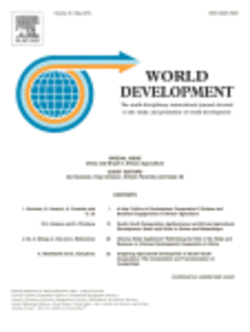Volume 81, Pages 1-92
China and Brazil in African Agriculture
Edited by Ian Scoones, Kojo Amanor, Arilson Favareto and Gubo Qi
A New Politics of Development Cooperation? Chinese and Brazilian Engagements in African Agriculture
Ian Scoones, Kojo Amanor, Arilson Favareto, Gubo Qi
Ian Scoones, Kojo Amanor, Arilson Favareto, Gubo Qi
- Chinese and Brazilian development cooperation in Africa increasingly includes agriculture.
- This involves agribusiness, contract farming, technology demonstration, and training.
- Interventions are framed by Chinese and Brazilian domestic political economies and histories.
- There is no singular “model” of Brazilian or Chinese agricultural development.
- All interventions are renegotiated during development processes in Africa.
South–South Cooperation, Agribusiness, and African Agricultural Development: Brazil and China in Ghana and Mozambique
Kojo S. Amanor, Sérgio Chichava
- China and Brazil’s agricultural cooperation reflects recent developments in agribusiness.
- They develop interventions to promote the expansion of their agribusiness services in Africa.
- They engage in trilateral cooperation to facilitate agricultural commercialization.
- The outcomes are dependent upon national policies for smallholder and large-scale agriculture.
- Entrenched national economic interests can constrain agricultural cooperation initiatives.
Chinese State Capitalism? Rethinking the Role of the State and Business in Chinese Development Cooperation in Africa
Jing Gu, Chuanhong Zhang, Alcides Vaz, Langton Mukwereza
- The conventional wisdom of collusive state–business relations is misleading.
- There is a need to shift focus beyond the level of the central state.
- The process of “going global” is driven significantly by China’s provinces.
- Implementation of Chinese state policy is uneven, leaving policy lagging behind.
- Much Chinese state–business interaction in African agriculture is informal and decentralized.
Imagining Agricultural Development in South–South Cooperation: The Contestation and Transformation of ProSAVANA
Alex Shankland, Euclides Gonçalves
- South–South cooperation can be legitimated by landscape-based similarity claims.
- The development of Brazil’s Cerrado landscape has been seen as a model for Africa.
- ProSAVANA, a Brazil–Mozambique–Japan agriculture program, has drawn controversy.
- The controversy invokes landscape imaginaries of the Cerrado and of the savannah.
- This has important implications for future South–South cooperation in agriculture.
Brazil’s Agricultural Politics in Africa: More Food International and the Disputed Meanings of “Family Farming”
Lídia Cabral, Arilson Favareto, Langton Mukwereza, Kojo Amanor
PDF (416 K)
PDF (416 K)
Brazil’s domestic politics matter in understanding the practice of MFI abroad.
The multiple meanings of family farming found in Brazil are reproduced by MFI.
Brazil’s business and diplomatic imperatives also matter in understanding MFI.
MFI’s complex politics confront other political circumstances in African countries.
Agricultural cooperation is a battlefield between competing development narratives.
Chinese Migrants in Africa: Facts and Fictions from the Agri-Food Sector in Ethiopia and Ghana Seth Cook, Jixia Lu, Henry Tugendhat, Dawit Alemu
Chinese Agricultural Training Courses for African Officials: Between Power and Partnerships
Henry Tugendhat, Dawit Alemu
Science, Technology, and the Politics of Knowledge: The Case of China’s Agricultural Technology Demonstration Centers in Africa
Xiuli Xu, Xiaoyun Li, Gubo Qi, Lixia Tang, Langton Mukwereza













